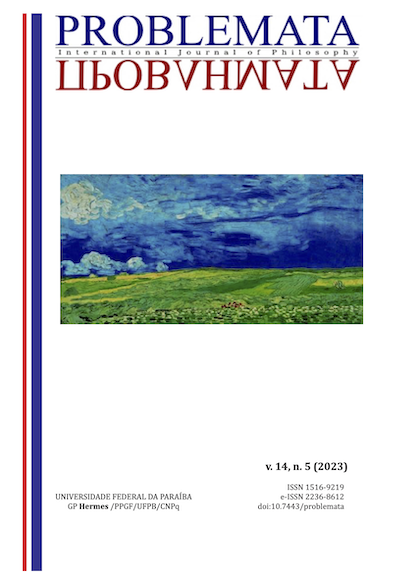GIFT, UNPRODUCTIVE EXPENDITURE AND CHARITY:
MAUSS, BATAILLE AND THE PHILANTHROPY PRACTICED BY BILLIONAIRES
DOI:
https://doi.org/10.7443/problemata.v14i5.68289Keywords:
gift, expenditure, philanthropy, subjectivation, neoliberalismAbstract
The notion of gift described by Marcel Mauss will be our object of reflection, especially its ambivalent ethics, which simultaneously encompasses rivalry and the establishment of enduring bonds. We will seek to analyze which aspects of the gift are absent and which seem to persist in neoliberal subjectivation processes, with special interest in virility associated with rivalry. Next, we will address the notion of unproductive expenditure formulated by Georges Bataille. Just as we will do with the gift, we will analyze to what extent the processes of subjectivation and economic practices instituted by neoliberalism move away from the notion of expenditure or incorporate it, and in what ways. Finally, we will deal with the principle of charity. Following Mauss, we will approach this principle as a kind of moral conception of the gift. Understanding philanthropy as one of the contemporary forms of charity, we will focus on the philanthropic actions of billionaire individuals, comparing it with the notions of gift and expenditure and reflecting on their intersubjective and political implications.
Downloads
References
ALLIEZ, Éric; LAZZARATO, Maurizio. Guerras e capital. Trad. Pedro Paulo Pimenta. São Paulo: Ubu Editora, 2021.
BATAILLE, Georges. A parte maldita, precedida de "A noção de dispêndio". Trad. Júlio Castañon Guimarães. Belo Horizonte: Autêntica Editora, 2016.
BAUMAN, Zygmunt. Amor líquido: sobre a fragilidade dos laços humanos. Trad. Carlos Alberto Medeiros. Rio de Janeiro: Jorge Zahar, 2004.
BENJAMIN, Walter. O capitalismo como religião. In: BENJAMIN, Walter. O capitalismo como religião. Trad. Nélio Schneider. São Paulo: Boitempo, 2013.
BUFFETT, Warren. Pledge letter. Giving pledge, 2010. Disponível em: https://givingpledge.org/pledger?pledgerId=177. Acesso em: 9 set. 2023.
CAILLÉ, A. O dom entre interesse e "desinteressamento". REALIS - Revista de Estudos AntiUtilitaristas e PosColoniais. v. 3, n. 1, jan.-jun. 2013. p. 8-42. Disponível em: https://periodicos.ufpe.br/revistas/index.php/realis/article/view/8776. Acesso em: 15 set. 2023.
CHAN, Priscilla; ZUCKERBERG, Mark. Pledge letter (2015). Giving pledge, 2010. Disponível em: https://givingpledge.org/pledger?pledgerId=314. Acesso em: 9 set. 2023.
COLLINS, Chuck; FLANNERY, Helen. Gilded giving 2020: how wealth inequality distorts philanthropy and imperils democracy. Institute for Policy Studies, 28 jul. 2020. Disponível em: https://inequality.org/great-divide/gilded-giving-2020/. Acesso em: 15 set. 2023.
CORREA, Cristiane. Sonho grande. Rio de Janeiro: Sextante, 2013.
DARDOT, Pierre; LAVAL, Christian. A nova razão do mundo: ensaio sobre a sociedade neoliberal. Trad. Mariana Echalar. São Paulo: Boitempo, 2016.
DESPENTES, Virginie. Teoria King Kong. Tradução de Márcia Bechara. São Paulo: n-1, 2016.
DUNKER, Christian. A busca da bicicleta perdida. In: DUNKER, Christian. Reinvenção da intimidade: políticas do sofrimento cotidiano. São Paulo: Ubu Editora, 2017. p. 7-9.
DUNKER, Christian. Solidariedade sem transcendência? In: DUNKER, Christian. Reinvenção da intimidade: políticas do sofrimento cotidiano. São Paulo: Ubu Editora, 2017. p. 263-264.
GATES, Bill; GATES, Melinda. Pledge letter (2010). Giving pledge, 2010. Disponível em: https://givingpledge.org/pledger?pledgerId=429. Acesso em: 9 set. 2023.
GIVING pledge. About the giving pledge. Página institucional, 2010. Disponível em: https://givingpledge.org/about. Acesso em: 9 set. 2023.
GRAEBER, David; LANNA, Marcos. Comunismo ou comunalismo? A política e o "Ensaio sobre o dom". Revista de Antropologia, v. 48, n. 2, jul-dez. 2005. p. 501-523. Disponível em: https://doi.org/10.1590/S0034-77012005000200003. Acesso em: 9 set. 2023.
LANNA, Marcos. Nota sobre Marcel Mauss e o Ensaio sobre a dádiva. Revista de Sociologia e Política, n. 14, jun. 2000. p. 173-194. Disponível em: https://doi.org/10.1590/S0104-44782000000100010. Acesso em: 10 set. 2023.
LAZZARATO, Maurizio. O governo do homem endividado. Trad. Daniel P. P. da Costa. São Paulo: n-1 edições, 2017.
MAUSS, Marcel. Ensaio sobre a dádiva: forma e razão da troca nas sociedades arcaicas. In: MAUSS, Marcel. Sociologia e antropologia. Trad. Paulo Neves. São Paulo: Ubu Editora, 2017. p. 191-330.
PAULANI, Leda Maria. Hayek e o individualismo no discurso econômico. Lua Nova, São Paulo, n. 38, p. 97-124, 1996. Disponível em: https://doi.org/10.1590/S0102-64451996000200006. Acesso em: 9 set. 2023.
PAULANI, Leda Maria. Neoliberalismo e individualismo. Economia e Sociedade, Campinas, v. 8, n. 2, p. 115–127, 2016. Disponível em: https://periodicos.sbu.unicamp.br/ojs/index.php/ecos/article/view/8643138. Acesso em: 9 set. 2023.
SAFATLE, Vladimir. A economia é a continuação da psicologia por outros meios: sofrimento psíquico e o neoliberalismo como economia moral. In: SAFATLE, Vladimir.; SILVA JUNIOR, Nelson; DUNKER, Christian (Org.). Neoliberalismo como gestão do sofrimento psíquico. Belo Horizonte: Autêntica, 2021. p. 17-46.
SCHUMPETER, Joseph. Teoria do desenvolvimento econômico. Trad. Maria Sílvia Possas. São Paulo: Nova Cultural, 1997.
SMITH, Adam. Teoria dos sentimentos morais. Trad. Lya Luft. São Paulo: Martins Fontes, 1999.
SPENCER, Herbert. The man versus the State. Caldwell: The Caxton Printers, 1960.
WEBER, Max. A ética protestante e o "espírito" do capitalismo. Trad. José Marcos Mariani de Macedo. São Paulo: Companhia das Letras, 2004.
Downloads
Published
Issue
Section
License
Copyright (c) 2024 Paula Ordonhes

This work is licensed under a Creative Commons Attribution 4.0 International License.
Authors who publish with this journal agree to the following terms:
- Authors retain copyright and grant the journal right of first publication with the work simultaneously licensed under a Creative Commons Attribution License that allows others to share the work with an acknowledgement of the work's authorship and initial publication in this journal.
- Authors are able to enter into separate, additional contractual arrangements for the non-exclusive distribution of the journal's published version of the work (e.g., post it to an institutional repository or publish it in a book), with an acknowledgement of its initial publication in this journal.
-
- Authors are permitted and encouraged to post their work online (e.g., in institutional repositories or on their website) prior to and during the submission process, as it can lead to productive exchanges, as well as earlier and greater citation of published work (See The Effect of Open Access).





